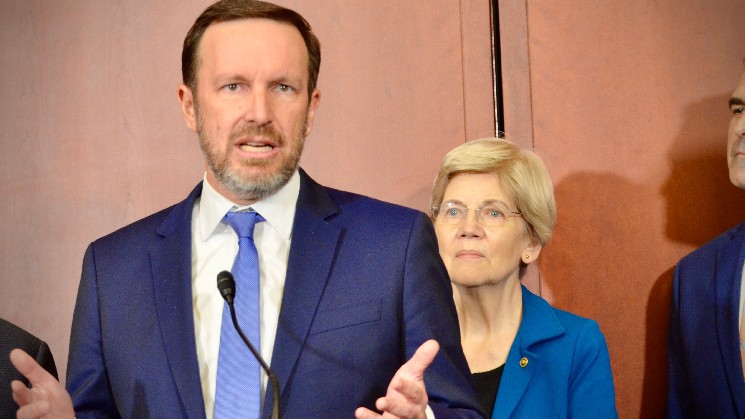The U.S. Senate has never been closer to approving a major piece of crypto legislation as it mulls the stablecoin-regulation bill, but some Democrats are insisting that the final debate needs to address the accused conflicts of President Donald Trump.
Proponents of the U.S. stablecoin legislation were hoping to cap off their effort in a single week, but debate will continue into a second week of floor action on the bill to set oversight of the dollar-based tokens at the heart of digital assets trading.
Part of that debate will be a push from a prominent faction of Democrats, including Senators Elizabeth Warren and Chris Murphy, to amend the legislation to directly ban the president and other senior government officials (including members of Congress) from engaging in stablecoin business — a restriction that Trump would already run afoul of with his family’s World Liberty Financial.
“Elected officials have a responsibility to serve the American people — not line their own pockets,” a group of seven Democrats that also includes Minority Leader Chuck Schumer said in a statement on Friday, the day after Trump welcomed more than 200 of the top investors in his own memecoin to a private dinner. “To crack down on the blatant corruption of the president and his family, our amendment prohibits the president, vice president and senior government officials from directly or indirectly profiting from a stablecoin venture while in office.”
Read More: Democrats Threaten Lawsuits, Join Protests Ahead of Trump Memecoin Dinner
Other Democrats who chose at the start of last week to move ahead with the bill have argued that the U.S. Constitution already makes it illegal for the president to accept anything of value from foreign interests, as they claim Trump is doing with his family crypto business. Those senators, including Kirsten Gillibrand of New York, have said there’s no need to repeat it in the stablecoin bill. But Murphy countered at a Thursday press conference that pursuing legal breaches under that constitutional provision is much harder than just clearly making a new law that carries explicit consequences.
Senator Bill Hagerty, the Tennessee Republican who backed the Guiding and Establishing National Innovation for U.S. Stablecoins (GENIUS) Act, said in a Friday interview on Fox Business that he’s “optimistic as we embrace this piece of legislation, and I’m delighted that we’ve gotten strong, bipartisan support here, that we’re moving in the right direction.” The bill cleared a so-called cloture vote on Monday that required 60 votes, with supporters numbering 66, including more than a dozen Democrats.
The vote to advance the bill meant a defined period of floor debate would commence before it must clear another cloture hurdle and get its final vote on approval, which would happen with a simple majority. At that time, the House can either adopt the Senate’s work or pass something similar that can be meshed with the GENIUS Act in a compromise negotiation that would lead to still more votes.
Murphy said on Thursday that the stablecoin debate will continue through next week. In response to a question from CoinDesk, he said some fellow Democrats who approved the previous cloture vote might not do so again if the current stablecoin debate doesn’t get into the Trump issue.
Many of the same Democrats who have been protesting Trump’s memecoin dinner are seeking to steer the stablecoin debate toward the potential conflicts of government officials. Murphy said Trump is running “the most corrupt White House in the history of the country.”
“Just because the corruption is playing out in the public where everybody can see it doesn’t mean that it isn’t rampant, rapacious corruption,” he said.
But Trump’s son, Eric, appeared at Consensus 2025 in Toronto earlier this month, arguing that the crypto business matters are not offering access to the presidency.
“I started World Liberty long before he ever got elected,” Eric Trump said. “We were in the crypto world long before he was ever elected, and one has absolutely nothing with the other.”
And Bo Hines, a White House adviser for digital assets, said at the same Consensus event that “the president of the United States can’t be bought.”

